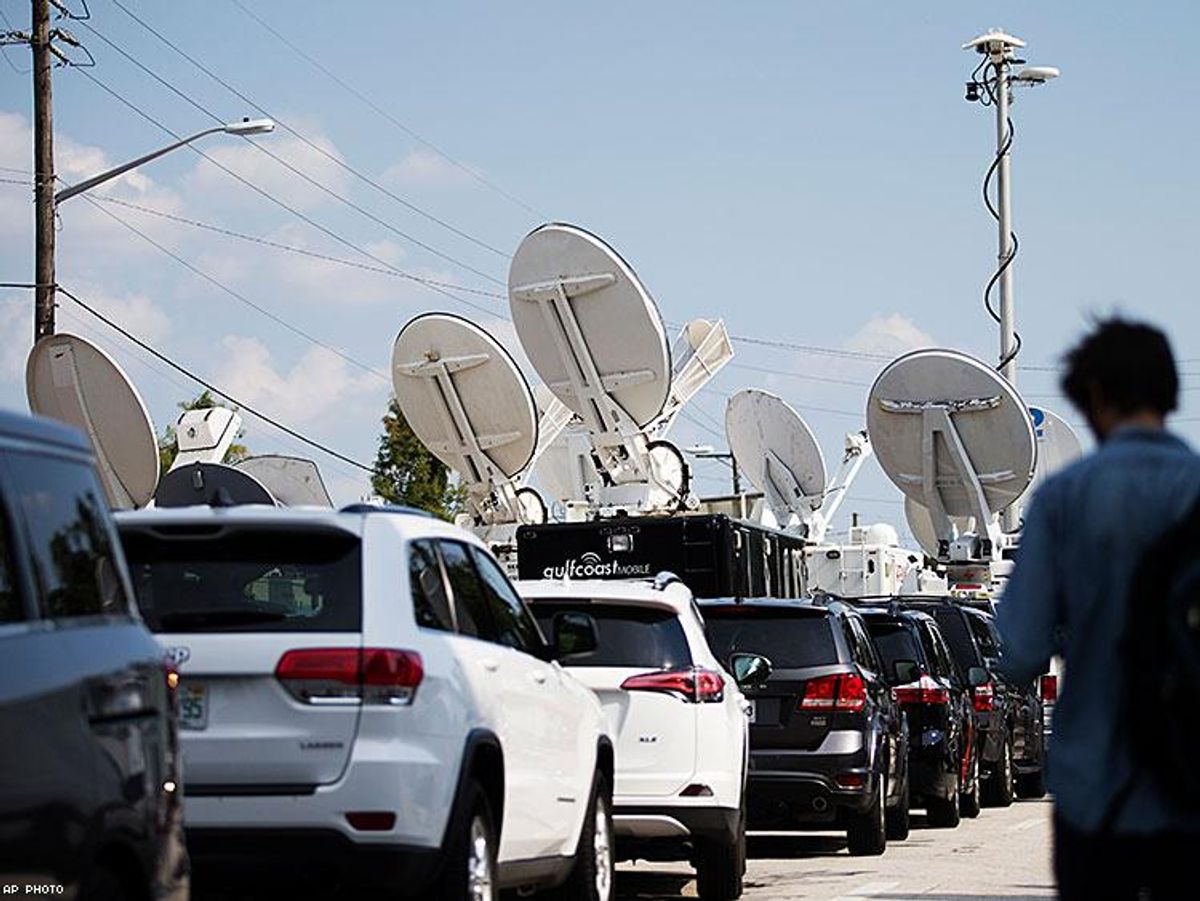The media descended on Orlando swiftly after the Pulse massacre last June. Cameras captured stories of survivors, of families of the 49 who died in the attack, of a shooter killed by police after holing up in the club for hours. So it surprised many when the White House included Pulse in a list of 78 terror attacks that President Trump believed did not receive "the media attention they deserved."
Orlando officials scratch their head at the remark.
"I still get calls from all over the world," says City Commissioner Patty Sheehan, who district includes the Pulse site. Fact-checkers for PolitiFact, owned by the Florida-based Tampa Bay Times, found that nearly every attack on Trump's list received some media response and particularly questioned his assertion in regard to the Orlando tragedy. "The White House's suggestion that the shooting at a gay nightclub in Orlando, the largest mass shooting in U.S. history, was underreported truly baffles us," the team wrote.
Yet survivor Chris Hansen, who crawled to safety shortly after Omar Mateen started shooting people in the club, wonders if the president has a point. Sure, there was wall-to-wall coverage in the immediate aftermath of the attack, but it wasn't long before CNN and Fox cameras turned toward the next national news event. "I feel like the national media stayed, got their story and did what they do for the first couple weeks," he says. "Then it was just state and local."
Certainly, the media couldn't hold its attention on the attack as long as the makers of fake news videos, which today fill YouTube with theories about every victim and survivor being a mannequin or a "crisis actor." When Hansen searches his own name online, it's easier to find new "articles" that attempt to discredit him as a liar and seek to prove the attack never happened than it is to get new information about an event that continues to shake the Orlando community. Friends living overseas say they never heard of the attack until Hansen told them himself, and even some of them have questioned if it was real because hoax coverage today is more prevalent than attention from actual news sources. "It's crazy," Hansen says. "We don't need to be forgotten. We need to be remembered so this doesn't happen again."
Of course, others who have found themselves at the center of coverage don't feel the event has been ignored. Christine Leinonen, whose son Christopher "Drew" Leinonen was killed alongside boyfriend Juan Ramon Guerrero, says media attention sustained itself on the story of her loss. "I've been interviewed by TV news in Norway, Japan, Belgium, Germany, and all that is in addition to speaking to Anderson Cooper and everybody you can think of," she says. "It couldn't be more worldwide."
Leinonen has been the subject of plenty of fake news "coverage" as well. But she says the world has barely turned its eyes away from the terror attack in Orlando.
There's also the question of whether the Pulse massacre should be labeled a terrorist attack. Shooter Omar Mateen was born and lived in the United States, and no information has been made public suggesting he acted on direct orders from any terrorist organization.
Mateen did claim allegiance to the Islamic State on the night of the shooting, and ISIS leaders took credit for the attack. That's enough in Leinonen's eyes to prove he was a terrorist. "He was inspired by terrorist groups," she says, noting Mateen also had been fired from a courthouse job in Florida for saying he was related to the Boston Marathon bombers and the Fort Hood shooter and had even faced issues in school for insensitive remarks after the 9/11 attacks.
But for many, the label of terrorism serves as a smoke screen for a greater issue: homophobia. "I understand there may be more money available to law enforcement if we categorize it as a terrorist attack, and I don't want to stand in the way of resources, but to me it's a stretch," says Sheehan, who was the first out official ever elected to office in Florida. "This was a hate crime, and folks don't want to categorize it as such because they don't want to look at the own way they have treated the LGBT community." Sheehan suggested the White House also wants to turn the dialogue to terrorism to avoid discussing gun control and how a man with Mateen's history could buy a high-capacity weapon.
Hansen he remains conflicted, especially considering wide reports after the shooting that Mateen, while raised in a conservative, religious home, may have been a closeted gay man. "The shooter did call and say he was part of a terror group, so he made it seem like terrorism," Hansen says. "But if he is really gay, the way he was raised and brought up was challenging. This was a guy looking for acceptance and love."
Those issues may have played the greatest role in spurring Mateen to act.

















































































